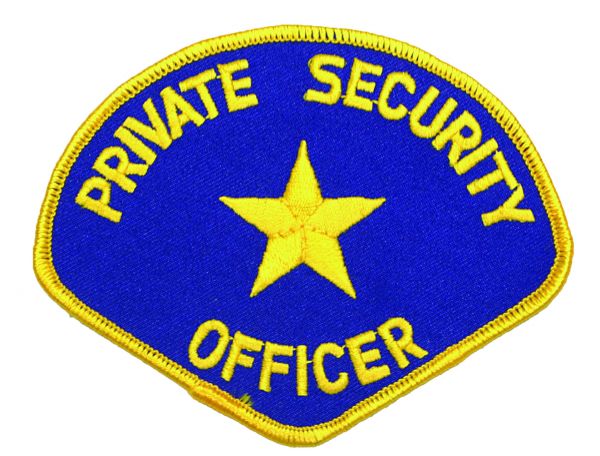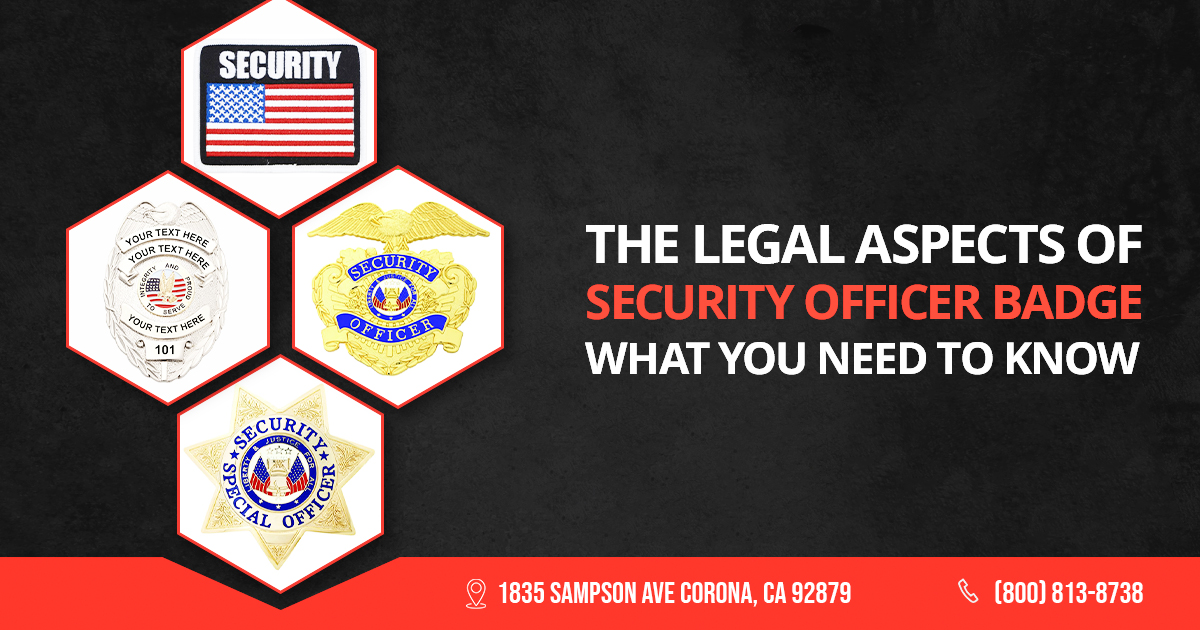A security officer badge is an important symbol of authority and identification for private security personnel in the USA. However, there are specific legal guidelines surrounding the use of security badges that both security companies and officers need to be aware of. This blog post explores the key laws and regulations regarding security officer badges you need to know.
What is Considered an Official Security Officer Badge?
A security officer badge typically contains the word Private Security, Badge Number, Legal Security Company Name, and the company logo. It allows the officer to identify themselves and their employer. There are general badge guidelines outlined by associations like BSIS, ASIS International, and countless other State Agencies that govern many security companies across the USA.

To be considered an official badge, specific criteria should be met:
- Legal Name of the employing company,
- An Unique Badge Number unique to that officer
- The word Private Security
- No use of insignia that could cause confusion with local, state, or Federal law enforcement agencies.
Laws on Wearing and Displaying Security Badges
There are a few key laws surrounding how and when security badges can be displayed:
- Officers must wear and clearly display their badge while on duty for identification purposes. Obstructing or hiding the badge is illegal.
- Impersonating a security officer by wearing a badge without authorization can result in fines or criminal charges.
- The use of terminology like “police” or law enforcement insignias on a private security badge is illegal in most states.
- Badges can generally only be worn on uniform shirts or jackets, not everyday clothing off-duty.
These laws help reinforce the authority of legitimate security personnel while preventing security impersonation or misrepresentation.
Regulations for Purchasing Security Officer Badges
For a private security company to purchase and issue badges, certain federal and state regulations apply:
- Security companies must be licensed in their state to employ security officers legally.
- All employed security officers must meet training requirements for that state before being issued a badge.
- Only the licensed security company can purchase badges – officers cannot obtain their own badges independently.

There are also guidelines around materials, size, appearance, and wording of badges. Pivotal details like the officer’s name and ID number must be correct. As a security company, staying up to date on any changing regulations in your state is crucial.
Controlling Badge Use and Replacing Lost or Stolen Badges
Once a security officer is issued a badge, there are security protocols that companies should follow:
- Keep detailed records of which badges have been given to which employees
- Implement a badge return process when an employee leaves the company
- Report lost or stolen badges to local authorities immediately
- Badges should only be replaced with proper authorization and a paper trail
- Destroy and dispose of any returned badges appropriately

Following badge inventory procedures and reporting any missing or stolen badges is essential for security and preventing misuse. Damaged or lost badges can be replaced cost-effectively through reputable vendors like ProUniforms, Inc.
The Legal Implications of Badge Misuse
There are legal consequences if security badges are misused or misrepresented:
- Impersonating a security officer with a fake badge can lead to criminal charges.
- Impersonating a Police Office is a felony in most states.
- Displaying a badge after leaving a security company may constitute impersonation.
- Off-duty officers wearing or flashing a badge improperly could face action.
- Using law enforcement terminology or insignia on a badge is illegal.
Companies and officers should be vigilant against badge misuse. Ensure only current employees wear an official badge and that badges are returned upon termination.
Custom Security Officer Badges – Legal Requirements
Many security companies opt for custom-designed badges featuring their brand and logo. When ordering custom badges, be aware of key legal guidelines:
- Custom badges must still contain all legally required details like the legal company name.
- A unique badge number for each employee.
- The word “Private Security” must be on the badge to avoid confusion with local, state and federal police officers.
- Get legal approval before using any terminology or images that imply law enforcement authority.
- Impersonating a local, state or federal police officer is a felony in most states.
Consult ProUniforms’ team or legal counsel to ensure your custom badge aligns with all regulations. We offer hassle-free customization.
ProUniforms, Inc. has done the necessary research in all 50 States, so we have that information available at no cost to you. Give us a call at 800-813-8738 to speak with one of our knowledgeable Account Executives and we will gladly share this important information with you at no cost. Call today!
Security Forces Patch Regulations
Along with badges, many security personnel also wear uniform patches or emblems. Relevant laws include:
- Security patching must not use “police” or similar terminology implying legal authority.
- Law enforcement agency patches and emblems are not permitted.
- Any symbols or words must not cause confusion with law enforcement patches.

Security guard patches should match and clearly identify the officer’s security company. Familiarize yourself with any state laws regulating uniform patches and insignia wording.
Vital Legal Considerations for Security Guard Badges
To summarize, these are the key legal considerations surrounding official security officer badges that companies should keep in mind:
- Badges can only be purchased and issued by licensed security companies to adequately trained officers.
- Badges must meet content requirements like legal security company name.
- Unique Badge numbers for each officer.
- Badges can only be worn while on duty and must be clearly visible.
- Offensive terminology, false claims of legal authority, or impersonation attempts are illegal.
- Lost or stolen badges must be reported immediately.
- Returned badges should be disposed of properly by security companies.
Adhering to laws and best practices around badge use, purchasing, and replacement will secure your company and officers. Reach out to our team here at ProUniforms if you need any guidance or help sourcing compliant, professional security badges or patches.
